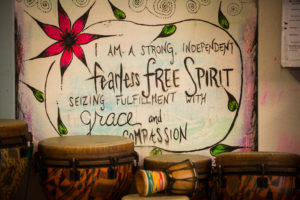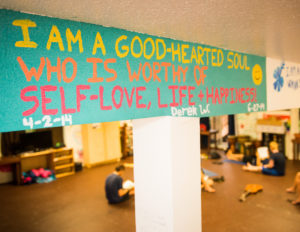In this four part series, Janna Pate explores the Rites of Passage work at Pacific Quest. From “Huli Ka’e,” the Rites of Passage experience that students participate in, to the “Staff Vision Fast,” a unique opportunity for staff to gain personal and professional development and a deeper understanding of this important component of the Pacific Quest curriculum.
By: Janna Pate, Academic Coordinator
The room I stepped into was the interior design equivalent of a full-body tattoo. Every wall surface and even the ceiling were hand-painted with colorful images, statements and signature markings: suns, moons, and stars, handprints and portraits, full hearts and open eyes, mountains and oceans, intricate mandalas, names and dates, branching trees and budding flowers, ships with sails and birds taking wing. Every entry had its own message: “I am an invincible huntress,” “I am an intrepid captain,” “I am a captivating creator,” “I am a brave and influential man.”
 That was my introduction to Hawaii, to Pacific Quest, and to Rites of Passage. Later, I would come to know the writings on the wall as Intent Statements. But in the moment, what mattered about that scene was this: curiosity and amazement, those powerful feelings of wonder and awe, sparking in my chest like the kindling of the earth’s first fire. It was the same feeling I had when I read the poetry of Mary Oliver for the first time: “The fish leaps, all rainbow and mouth, from the dark water,” and my own mouth fell open. The same feeling I had when I took my first wind-kissed boatride. Or when I saw snow for the first time and danced for what seemed like hours under the starlit sky, wearing only a nightgown and bare feet.
That was my introduction to Hawaii, to Pacific Quest, and to Rites of Passage. Later, I would come to know the writings on the wall as Intent Statements. But in the moment, what mattered about that scene was this: curiosity and amazement, those powerful feelings of wonder and awe, sparking in my chest like the kindling of the earth’s first fire. It was the same feeling I had when I read the poetry of Mary Oliver for the first time: “The fish leaps, all rainbow and mouth, from the dark water,” and my own mouth fell open. The same feeling I had when I took my first wind-kissed boatride. Or when I saw snow for the first time and danced for what seemed like hours under the starlit sky, wearing only a nightgown and bare feet.
Of course not all transformative moments are beautiful moments. Some are staggeringly sad, others outrageous. Some are tragic or even traumatizing. Some are deeply depressing. Some transformative moments are wedded to grief, some to suffering, and others to pain. The death of a loved one. A difficult and damaging childhood. The loss of a job. Sickness of the body. Sickness of the mind. A spiritual crisis. Broken relationships. Broken families. A fight with our very own demons.
Our most difficult moments are often our greatest teachers—or they can be, if we are prepared to learn from, to appreciate, and to respond to them to the best of our ability. Everyone must prepare his or her own tool kit—the carpetbag of things that carry a person throughout the day. Some people seem to be a bit of a Mary Poppins in this regard, able to reach for just about anything and call it to their aid.
My own tool kit has developed a bit more slowly and feebly over time, and on the whole, I suspect that I have tossed out at least as many resources as I have allowed in. Some things are constants for me, like music, writing, and exercise. Other things have come and gone, been outgrown, replaced, or simply forgotten—morning coffee, for example, or even my baby blanket.
Read on for Part II of this series!
